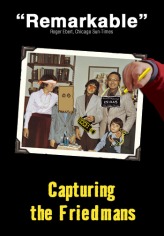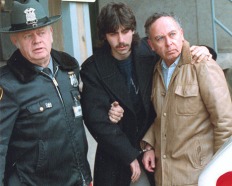|
Capturing the Friedmans
|
| |
 |
Documentary. USA, 2003. Not rated.
107 minutes.
Featuring:
Arnold Friedman, David Friedman, Elaine Friedman, Jesse Friedman, Howard
Friedman, Seth Friedman, Peter Panaro, Frances Galasso, Debbie Nathan,
Joseph Onorato, Judd Maltin, Jerry Bernstein, Abbey Boklan
Music: Andrea Morricone
Cinematographer: Adolfo Doring
Editor: Richard Hankin
Producers: Andrew Jarecki, Marc Smerling
Director: Andrew Jarecki
LINKS
|
Note: In order to comment effectively on this documentary,
it has been necessary to include some spoilers.
 inner
of the Grand Jury Prize at the 2003 Sundance Film Festival, Capturing the
Friedmans is an involving documentary that takes a notorious case of persistent,
widespread child molestation and turns it into an engrossing character study
that uncovers ambiguity and bias in unforeseen places. Examining the 1987 case
of the Friedmans in Great Neck, Long Island, Capturing the Friedmans
is possible because of the existence of hundreds of hours of home movies made
by the Friedmans themselves. Long before reality television, long before videocameras
were even common, the Friedmans obsessively documented their lives, and continued
to do so right through the scandal.
inner
of the Grand Jury Prize at the 2003 Sundance Film Festival, Capturing the
Friedmans is an involving documentary that takes a notorious case of persistent,
widespread child molestation and turns it into an engrossing character study
that uncovers ambiguity and bias in unforeseen places. Examining the 1987 case
of the Friedmans in Great Neck, Long Island, Capturing the Friedmans
is possible because of the existence of hundreds of hours of home movies made
by the Friedmans themselves. Long before reality television, long before videocameras
were even common, the Friedmans obsessively documented their lives, and continued
to do so right through the scandal.
Opening in the same vein as films like Auto
Focus and Blue Velvet, Capturing the Friedmans introduces
us to a seemingly typical upper-middle class family. (We writers are contractually
obligated to use the phrase "seemingly typical" in all cases of suburban serial
murder or sex crimes.) We meet Arnold, a Columbia University graduate and award-winning
schoolteacher who holds computer classes for neighborhood kids three times a
week in his basement. (Warning flag number one.) We meet his wife Elaine, who
unmistakably recalls Auto Focus when she comments that "Arnold liked
pictures," just as Auto Focus's Bob Crane was a "photography buff." (Warning
flag number two.) We hear also that Arnold didn't enjoy spending much time with
his wife and that he kept an office in the basement where the maid wasn't allowed
to clean. (Warning flags numbers three and four.) But, because these signs are
not uncommon in other families with no horrifying secrets, they were easily
ignored in the context of an apparently healthy, reputable family raising three
active boys.
The Friedman's apparent normalcy comes to an end when postal inspector John
McDermott intercepts an envelope from the Netherlands containing child pornography.
The envelope is addressed to Arnold. Two search warrants and a broken-down door
later, Arnold and the youngest son Jesse, now eighteen, are taken away in handcuffs
while eldest son David throws a fit as he walks around wearing underwear on
his head to avoid being filmed by television cameras. The charges are, in addition
to possession of a large stash of pornography depicting men with underage boys,
ninety-one counts of orally and anally sodomizing boys from the computer class.
Jesse, who assisted Arnold, was linked by the students in police interviews,
some of whom are interviewed again by director Andrew Jarecki for the movie.
One even describes naked leapfrog games in the classroom that involved acts
of sodomy.
The Friedmans' naivete is disconcerting. Nobody seems to understand, initially,
that the charges are serious. When Elaine is shown one of the pornographic photos,
she comments, "My eyes were in the right direction, but my brain saw nothing,"
which may serve to explain why she never suspected anything.  "I
had a good family, right? Where did this come from?" David, who is interviewed
extensively by Jarecki (David's cooperation made the film possible), simply
refuses to believe a single thing. Yet the evidence is overwhelming. Even the
judge recalls that she never had a doubt as to Arnold and Jesse's guilt, describing
the case as a nightmare even by the standards of the heinous crimes she saw
all the time.
"I
had a good family, right? Where did this come from?" David, who is interviewed
extensively by Jarecki (David's cooperation made the film possible), simply
refuses to believe a single thing. Yet the evidence is overwhelming. Even the
judge recalls that she never had a doubt as to Arnold and Jesse's guilt, describing
the case as a nightmare even by the standards of the heinous crimes she saw
all the time.
The Friedman family fractures with the males on one side and Elaine, who becomes
the most willing to believe in her husband's guilt, on the other. There is a
growing recognition that Arnold's case is hopeless because of the illegal pornography
he possessed, and so Arnold pleads guilty in order to separate himself from
Jesse. Though David accuses the lawyers and Elaine of manipulating Arnold into
taking a plea, we hear secondhand that Arnold makes some shocking revelations
about his childhood, and admits to having had sexual "activity" with two boys,
not in Great Neck.
The separation of Arnold's case doesn't help Jesse any, who is convinced that
no jury will listen to him. Probably he is right. Under pressure from Elaine
and lawyer Peter Panaro, he also pleads guilty. Panaro tells Jarecki that Jesse
admitted his guilt to him privately, before doing so in open court.
The outline of the Friedman's story is known, and the film is not remarkable
for presenting it to us. Capturing the Friedmans is fascinating more
for the questions it uncovers about the generally accepted version of events.
We know that Arnold and Jesse Friedman were evil monsters who took advantage
of innocent boys. However, watching them in their own home movies, it becomes
impossible to see them as anything other than human beings—twisted, appalling
human beings to be sure, but human beings nonetheless. They're not supposed
to be like us, are they? We're not supposed to have anything in common with
them. The very thought is uncomfortable, yet unavoidable.
Jarecki uncovers some unexpected shakiness in the case. Jarecki introduces
us to Debbie Nathan, an investigative journalist who chases cases where large
groups of witnesses—according to her—are lying. It is a fact that
the case against the Friedmans relied wholly on witness testimony. Absolutely
no physical evidence of sexual abuse was discovered. Nathan's point of view
is that the testimony is so outrageous that it would have been impossible for
Arnold and Jesse to cover up what was going on for four years. Given that the
class was only an hour long, she and others wonder how parents who picked up
their kids every day, three days a week, could not notice anything. She suggests
that the case was built on community hysteria, roused by the police interrogations
and the presence of child pornography in the Friedman home. She describes a
scenario of families all talking to each other, bullying the ones who don't
see abuse, accusing them of being in denial. One police investigator comments
that one must be careful in interrogating kids because they want to please with
their answers, yet one parent describes the police interview as browbeating—"We
know what happened! Tell us!"
Not all the students testified to being raped; those students who didn't describe
ordinary, boring computer lessons at the Friedman home. Some are adamant that
they never saw anything happen. A couple of former students now admit their
testimony, which supported at least sixteen counts, was false. Another kid describes
a mathematically improbable number of individual acts of sodomy, forty-one,
during a single ten-week lesson period (which would consist of thirty lessons).
Yet another former student, the one who describes the naked leapfrog games,
earlier in the same interview tells Jarecki that the abuse only occurred in
separate rooms, away from the other students, contradicting himself right on
camera. It emerges that his abuse, on which five counts were based, was recalled
only after hypnosis therapy. Meanwhile, Jesse claims that Panaro fed him his
story only to get sympathy from the judge, and Arnold's brother Howard convincingly
casts doubt on the things Arnold allegedly described about their childhood.
The tears Jesse sheds in court as he admits his crimes look plenty real, however.
At other times, he seems not to be overly concerned about his fate. David comments,
"Jesse has always been the most comfortable with this situation." If, as it
is said, the guilty tend to be less outraged over their arrest and many child
abusers secretly desire to be caught, Jesse's demeanor suggests guilt. Arnold,
too, seems overly passive. In any event, child pornography was in his possession,
and that's a fact. David's outrage over the charges could be seen as the behavior
of someone who knows his family is innocent, or as the aggressive denial of
someone who himself has something to hide. Given the family history, David's
chosen vocation as a professional birthday party clown is concerning, and fits
the pattern of endemic abuse.
Some will find Capturing the Friedman's ambiguity dissatisfying, but
ambiguity is precisely the most interesting aspect of the film. What emerges
is that the Friedmans are guilty of something, but almost certainly not guilty
of everything they were accused of, and there may be at least a reasonable doubt
as to Jesse's guilt. Yet establishing guilt or innocence is not Jarecki's goal.
The film is an examination of the complexity of characters and behaviors that
we would prefer to explain simply, the slippery nature of memory, and the elusiveness
of objective truth. Elaine herself says, "People's visions are distorted," and
Jarecki comments that in making the film, he never got the same version of the
story twice. He hopes that people will leave his film not feeling like they're
supposed to think something, but just that they're supposed to think. He is
likely to get his wish.
Review
© June 2003 by AboutFilm.Com and the author.
Images © 2003 Magnolia Pictures. All Rights Reserved.

 "I
had a good family, right? Where did this come from?" David, who is interviewed
extensively by Jarecki (David's cooperation made the film possible), simply
refuses to believe a single thing. Yet the evidence is overwhelming. Even the
judge recalls that she never had a doubt as to Arnold and Jesse's guilt, describing
the case as a nightmare even by the standards of the heinous crimes she saw
all the time.
"I
had a good family, right? Where did this come from?" David, who is interviewed
extensively by Jarecki (David's cooperation made the film possible), simply
refuses to believe a single thing. Yet the evidence is overwhelming. Even the
judge recalls that she never had a doubt as to Arnold and Jesse's guilt, describing
the case as a nightmare even by the standards of the heinous crimes she saw
all the time.
